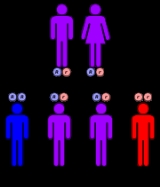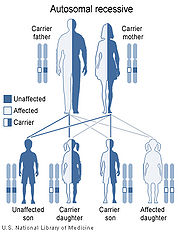
Primary carnitine deficiency
Encyclopedia
Systemic primary carnitine deficiency (CDSP), also called deficiency of plasma-membrane carnitine transporter, carnitine transporter deficiency (CTD) or carnitine uptake defect (CUD), is an autosomal
recessive metabolic disorder that prevents the body from using fats
for energy, particularly during periods without food. Carnitine
, a natural substance acquired mostly through diet, is used by cells to process fats and produce energy. People with primary carnitine deficiency have defective proteins called carnitine transporters, which bring carnitine into cells and prevent its escape from the body.
); an enlarged, poorly pumping heart (cardiomyopathy
); confusion; vomiting; muscle weakness; and low blood sugar (hypoglycemia
). Serious complications such as heart failure, liver
problems, coma
, and sudden unexpected death are also a risk. Acute illness due to primary carnitine deficiency can be triggered by periods of fasting or illnesses such as viral infections, particularly when eating is reduced.
 CDSP is caused by mutation
CDSP is caused by mutation
s in the SLC22A5
gene
, located on chromosome
5q31.1
. Improper function of this gene leads to the production of defective carnitine transporters. As a result of reduced transport function, carnitine is lost from the body and cells are not supplied with an adequate amount of carnitine. Without carnitine, fats cannot be processed correctly and are not converted into energy, which can lead to characteristic signs and symptoms of this disorder.
It is an autosomal recessive disorder, which means the defective gene responsible for the disorder is located on an autosome
(chromosome 5 is an autosome), and two copies of the defective gene (one inherited from each parent) are required in order to be born with the disorder. The parents of an individual with an autosomal recessive disorder both carry
one copy of the defective gene, but usually do not experience any signs or symptoms of the disorder.
This condition is sometimes mistaken for Reye's syndrome
, a severe disorder that develops in children while they appear to be recovering from viral infections such as chicken pox or flu. Most cases of Reye syndrome are associated with the use of aspirin
during these viral infections.
and 1 in every 37,000 to 100,000 newborns in Australia
. Of particular interest is the population of the Faroe Islands
, in which the condition is found in about 1 in every 500 people. The incidence of this condition in other populations has not been determined.
This article incorporates public domain text from The U.S. National Library of Medicine
Autosome
An autosome is a chromosome that is not a sex chromosome, or allosome; that is to say, there is an equal number of copies of the chromosome in males and females. For example, in humans, there are 22 pairs of autosomes. In addition to autosomes, there are sex chromosomes, to be specific: X and Y...
recessive metabolic disorder that prevents the body from using fats
Lipid
Lipids constitute a broad group of naturally occurring molecules that include fats, waxes, sterols, fat-soluble vitamins , monoglycerides, diglycerides, triglycerides, phospholipids, and others...
for energy, particularly during periods without food. Carnitine
Carnitine
Carnitine is a quaternary ammonium compound biosynthesized from the amino acids lysine and methionine. In living cells, it is required for the transport of fatty acids from the cytosol into the mitochondria during the breakdown of lipids for the generation of metabolic energy. It is widely...
, a natural substance acquired mostly through diet, is used by cells to process fats and produce energy. People with primary carnitine deficiency have defective proteins called carnitine transporters, which bring carnitine into cells and prevent its escape from the body.
Signs and symptoms
Typically, signs and symptoms of this disorder appear during infancy or early childhood and often include brain function abnormalities (encephalopathyEncephalopathy
Encephalopathy means disorder or disease of the brain. In modern usage, encephalopathy does not refer to a single disease, but rather to a syndrome of global brain dysfunction; this syndrome can be caused by many different illnesses.-Terminology:...
); an enlarged, poorly pumping heart (cardiomyopathy
Cardiomyopathy
Cardiomyopathy, which literally means "heart muscle disease," is the deterioration of the function of the myocardium for any reason. People with cardiomyopathy are often at risk of arrhythmia or sudden cardiac death or both. Cardiomyopathy can often go undetected, making it especially dangerous to...
); confusion; vomiting; muscle weakness; and low blood sugar (hypoglycemia
Hypoglycemia
Hypoglycemia or hypoglycæmia is the medical term for a state produced by a lower than normal level of blood glucose. The term literally means "under-sweet blood"...
). Serious complications such as heart failure, liver
Liver
The liver is a vital organ present in vertebrates and some other animals. It has a wide range of functions, including detoxification, protein synthesis, and production of biochemicals necessary for digestion...
problems, coma
Coma
In medicine, a coma is a state of unconsciousness, lasting more than 6 hours in which a person cannot be awakened, fails to respond normally to painful stimuli, light or sound, lacks a normal sleep-wake cycle and does not initiate voluntary actions. A person in a state of coma is described as...
, and sudden unexpected death are also a risk. Acute illness due to primary carnitine deficiency can be triggered by periods of fasting or illnesses such as viral infections, particularly when eating is reduced.
Cause and genetics

Mutation
In molecular biology and genetics, mutations are changes in a genomic sequence: the DNA sequence of a cell's genome or the DNA or RNA sequence of a virus. They can be defined as sudden and spontaneous changes in the cell. Mutations are caused by radiation, viruses, transposons and mutagenic...
s in the SLC22A5
SLC22A5
SLC22A5 is a membrane transport protein associated with primary carnitine deficiency.-External links:*...
gene
Gene
A gene is a molecular unit of heredity of a living organism. It is a name given to some stretches of DNA and RNA that code for a type of protein or for an RNA chain that has a function in the organism. Living beings depend on genes, as they specify all proteins and functional RNA chains...
, located on chromosome
Chromosome
A chromosome is an organized structure of DNA and protein found in cells. It is a single piece of coiled DNA containing many genes, regulatory elements and other nucleotide sequences. Chromosomes also contain DNA-bound proteins, which serve to package the DNA and control its functions.Chromosomes...
5q31.1
Chromosome 5 (human)
Chromosome 5 is one of the 23 pairs of chromosomes in humans. People normally have two copies of this chromosome. Chromosome 5 spans about 181 million base pairs and represents almost 6% of the total DNA in cells. Chromosome 5 is one of the largest human chromosomes, yet has one of the lowest gene...
. Improper function of this gene leads to the production of defective carnitine transporters. As a result of reduced transport function, carnitine is lost from the body and cells are not supplied with an adequate amount of carnitine. Without carnitine, fats cannot be processed correctly and are not converted into energy, which can lead to characteristic signs and symptoms of this disorder.
It is an autosomal recessive disorder, which means the defective gene responsible for the disorder is located on an autosome
Autosome
An autosome is a chromosome that is not a sex chromosome, or allosome; that is to say, there is an equal number of copies of the chromosome in males and females. For example, in humans, there are 22 pairs of autosomes. In addition to autosomes, there are sex chromosomes, to be specific: X and Y...
(chromosome 5 is an autosome), and two copies of the defective gene (one inherited from each parent) are required in order to be born with the disorder. The parents of an individual with an autosomal recessive disorder both carry
Genetic carrier
A genetic carrier , is a person or other organism that has inherited a genetic trait or mutation, but who does not display that trait or show symptoms of the disease. They are, however, able to pass the gene onto their offspring, who may then express the gene...
one copy of the defective gene, but usually do not experience any signs or symptoms of the disorder.
Diagnosis and treatment
CDSP is sometimes diagnosed in adults and is then thought to be less severe both in symptoms and life expectation. Treatment is usually done by supplementation of L-carnitine after assessing the severity of the deficiency after a muscular biopsy.This condition is sometimes mistaken for Reye's syndrome
Reye's syndrome
Reye's syndrome is a potentially fatal disease that causes numerous detrimental effects to many organs, especially the brain and liver, as well as causing a lower than usual level of blood sugar . The classic features are liver damage, aspirin use and a viral infection...
, a severe disorder that develops in children while they appear to be recovering from viral infections such as chicken pox or flu. Most cases of Reye syndrome are associated with the use of aspirin
Aspirin
Aspirin , also known as acetylsalicylic acid , is a salicylate drug, often used as an analgesic to relieve minor aches and pains, as an antipyretic to reduce fever, and as an anti-inflammatory medication. It was discovered by Arthur Eichengrun, a chemist with the German company Bayer...
during these viral infections.
Epidemiology
On the average, primary carnitine deficiency affects 1 in every 40,000 live births in JapanJapan
Japan is an island nation in East Asia. Located in the Pacific Ocean, it lies to the east of the Sea of Japan, China, North Korea, South Korea and Russia, stretching from the Sea of Okhotsk in the north to the East China Sea and Taiwan in the south...
and 1 in every 37,000 to 100,000 newborns in Australia
Australia
Australia , officially the Commonwealth of Australia, is a country in the Southern Hemisphere comprising the mainland of the Australian continent, the island of Tasmania, and numerous smaller islands in the Indian and Pacific Oceans. It is the world's sixth-largest country by total area...
. Of particular interest is the population of the Faroe Islands
Faroe Islands
The Faroe Islands are an island group situated between the Norwegian Sea and the North Atlantic Ocean, approximately halfway between Scotland and Iceland. The Faroe Islands are a self-governing territory within the Kingdom of Denmark, along with Denmark proper and Greenland...
, in which the condition is found in about 1 in every 500 people. The incidence of this condition in other populations has not been determined.
History
The current understanding of primary carnitine deficiency has been greatly influenced by the research of Doctors Susan C. Winter and Neil Buist. Dr. Winter was one of the first doctors in the United States to begin treating inborn errors of metabolism with intravenous carnitine.External links
This article incorporates public domain text from The U.S. National Library of Medicine

